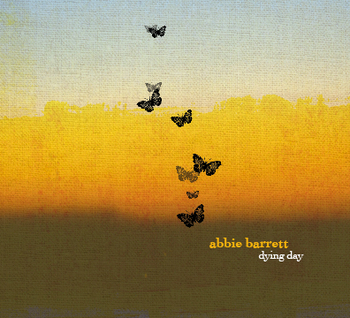
[purchase]
This music is female. No, I don’t mean feminine. And no, I don’t mean the artist is female, although she certainly is. I mean that the music itself is female. It feels the pull of the moon. It follows cycles within songs. And it has an ebb and flow, like a tide.
To begin with, Abbie Barrett has a rich alto voice. She can go from a breathy almost whisper to belting it out. She never has to strain, and she matches her tone perfectly to the emotion of the song or the moment. And that’s important, because there are many emotional shifts and bursts here within the songs.
Barrett writes here for a full band. I’m not even sure that I would want to hear her perform solo. There are drums, bass, electric and acoustic guitars, percussion and keyboards. There is a banjo on one song, horns on another. All of this might lead you to expect a big sound, and Barrett does deliver two outright rockers here. But most of the album is more subtle, and better for it. What the full band does do is deliver solid rhythm on every track, including executing some tricky sudden shifts in rhythm within a song.
I hope that not all of the narrators here are Abbie Barrett. There is too much heartbreak here for one person to bear. The songs are mostly in the first person, and tell of expectations shattered, relationships gone wrong, and hurtful behavior. In Train, Barrett sings, “... I sense the danger. It might even turn me on”, and that provides a key to these songs. Her characters leap headlong into relationships, never expecting them to last, but enjoying the ride while anticipating the hurt at the end. Train describes this brilliantly, using the metaphor of a ride on a train with no brakes to describe a relationship from start to finish. Stillborn, equally brilliantly, equates a relationship to a pregnancy that culminates in a stillbirth, an outcome the narrator finds that other people are unwilling to discuss. The two rockers come back to back in the middle of the album, and each is an eloquent brush-off.
Not all of the songs are hopeless or angry. Dying Day is almost a lullabye, welcoming the rest of night, after a rough day. And Bide My Time has a narrator who waits patiently, and with confidence in the ultimate outcome, for a woman to realize where love lies. And these songs are sequenced in a way that provides relief.
Most of the songs convey motion. The narrator starts in one place emotionally, and arrives in another place by song’s end. The exception is Night Driving. Here we find a woman who fears that arriving at a destination will bring failure. So she just drives. She is avoiding facing something, so she is stuck. She is in motion, but going nowhere. As rendered by Barrett, this is a fascinating paradox.
I’ve spoken more about the lyrics, and about the words to more of the songs, than I normally do. And I do thoroughly enjoy the music as well. Dying Day marks the arrival of not only a musician, but also a poet, to keep an eye on.
Abbie Barrett: Train
Abbie Barrett: Night Driving






0 comments:
Post a Comment